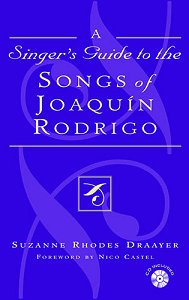Joaquín Rodrigo’s life spanned almost
the entire 20th century. He was born in 1901 and died
in 1999. But his fascinating, melodic music is by no means typical
of the 20th century and after the 2nd World
War he is a composer who has seemed out of step with current movements.
Instead he went his own way, drawing on the myriad forms of Spanish
music as inspiration. Virtually blind from the age of 3, he always
wrote music in Braille, subsequently dictating the music to a
copyist (a role not infrequently played by his wife).
Rodrigo trained in Paris with Paul Dukas and
joined the band of émigré Spanish composers resident
there, becoming friendly with Manuel de Falla as well as Honegger,
Milhaud and Ravel. His wife was the Turkish pianist, Victoria
Kamhi. Also a gifted linguist, she was Rodrigo’s collaborator
in his work for the rest of his life. The Spanish civil war meant
that it was not until 1939 that the Rodrigos were able to return
permanently to Spain.
Apart from a handful of famous concertos, most
people would be hard put to name many works by Rodrigo. So that
a flippant response to the title of this book would be, ‘Oh, did
he write any’. The answer of course is that he did write quite
a number of lovely songs which are scarcely known by singers.
There are two principal problems preventing the dissemination
of Rodrigo’s songs, they generally set Spanish texts and getting
hold of the music is difficult. It is to help alleviate these
problems that Suzanne Rhodes Drayer has written this useful little
book. She includes full details of the publishing house Ediciones
Joaquín Rodrigo, which was founded in 1989 by Rodrigo’s
daughter Cecilia, as they now publish all of Rodrigo’s music.
For American readers she also includes details of a music shop
in New York who can supply much of Rodrigo’s output. At the back
there is a select discography, but I would not like to estimate
how many of the discs are currently available.
The first two chapters of the book consist of
a short biography of Rodrigo and a complete list of his work and
a short biography of Rodrigo’s wife, an important and interesting
figure in her own right.
But the bulk of the book is a series of chapters
dealing with Rodrigo’s vocal works. Each song or song cycle is
given a brief description which includes details of the origin
of the text and some performance information, along with full
listings of the relevant instrumentation, duration, author of
the text and vocal range. Then the complete text is given line
by line along with phonetic versions of the text and word by word
translation of the line. This line by line text is then followed
by a more idiomatic translation.
This is all beautifully useful and will help
singers immensely in approaching this repertoire. But, given that
Rodrigo’s songs are so unknown outside Spain, I did feel that
Ms Drayer could have done a little more and written a little something
about each song, telling us more about the music, what the song’s
special qualities are and why someone might want to sing it.
Robert Hugill
